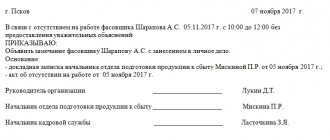What can lead to disciplinary action?
Sometimes an employer has to deal with the fact that an employee does not fulfill or improperly performs his direct duties.
In this case, the labor legislation of the Russian Federation provides for the right of the employer to take disciplinary action against the offending employee. A disciplinary sanction is applied to an employee when it is established that he has committed a disciplinary offense. A disciplinary offense may be considered a violation of an employee’s obligations as stated in the employment contract, job description, internal labor regulations and other provisions of the organization. Most often, punishment follows for non-compliance with labor discipline - in the case of:
- systematic tardiness and/or absenteeism;
- premature departures from work;
- failure to comply with management instructions;
- reporting to work under the influence of alcohol or drugs.
The list of disciplinary offenses can be continued depending on the specifics of the organization. As a rule, violations of labor safety rules, disclosure of confidential information, and non-compliance of the work performed with accepted quality criteria are most severely punished.
What types of disciplinary sanctions exist?
The Labor Code of the Russian Federation gives the employer the right to apply the following types of disciplinary sanctions:
- Comment.
- Rebuke.
- Dismissal on appropriate grounds (Article 192 of the Labor Code of the Russian Federation).
Often, personnel workers mistakenly believe that this formulation of the law means ranking punitive measures according to the degree of severity and chronology of application. In fact, labor legislation does not contain such instructions, nor does it provide clear definitions of these concepts. Consequently, the employer has the right, at his own discretion, to choose the type of punishment within the framework of the law. It is important to remember that Art. 193 of the Labor Code of the Russian Federation allows you to impose only one punishment for one disciplinary violation.
Legal regulation
Separate provisions of the Labor Code are devoted to the application of deadlines for disciplinary action.
So, in Part 1 of Art. 192 of the Labor Code states that an employee can be brought to disciplinary liability for an offense committed at work.
The very deadlines for issuing an order to bring an employee to disciplinary liability are prescribed in the Part. 3, 4 tbsp. 193 TK.
Local regulations for some employees (for example, civil servants and law enforcement officers) may provide their own deadlines for bringing disciplinary action. But, according to established practice, regarding the application of deadlines, legislators adhere to the provisions of the Labor Code.
Specifics of disciplinary sanctions for certain categories of citizens
Another type of disciplinary sanction is provided for civil servants: a warning about incomplete compliance with official duties.
For military personnel, the list of disciplinary punishments has been significantly expanded:
- severe reprimand;
- deprivation of an award badge;
- warning about incomplete job compliance;
- early dismissal. The reason in this case is failure to comply with the terms of the contract;
- demotion;
- demotion in rank;
- deduction from fees;
- expulsion from an educational institution;
- disciplinary arrest.
These types of punishments are enshrined in special legislative acts on public and military service.
Petition for removal of foreclosure
It is issued in the name of the manager. The document must contain the reasons for the disciplinary sanction, the facts for early termination of the order, and the full name of the punished employee. At the end of the petition the number of the order and the date of its entry into force are indicated.
The document must be signed by the immediate supervisor of the violator, the chairman of the trade union. The protocol (its number) must be attached to it. Representatives of the team who were present at the meeting also sign.
Procedure for applying disciplinary sanctions
Instructions on the procedure for applying punitive measures to civilian workers are given in Art. 192, 193 Labor Code of the Russian Federation. In accordance with them, if a violation of labor discipline is detected, the following sequence must be followed:
- Document the fact of a disciplinary violation in the form of an act or report.
- Ask the employee for a written explanation of what happened.
- Issue an order to impose one or another disciplinary sanction if the explanation does not contain valid reasons.
- Familiarize the culprit with the order of disciplinary action against the signature of the person within 3 days from the date of its issuance.
When drawing up an order, it is necessary to take into account that disciplinary sanction is applied no later than one month from the date of discovery of the offense, in accordance with Art. 193 Labor Code of the Russian Federation. An employee can appeal a disciplinary sanction to the state labor inspectorate or court. The procedure for applying disciplinary measures must be strictly observed; any violation of it may become the basis for a decision by supervisory authorities in favor of the employee.
Sample order for disciplinary action
Consequences of disciplinary liability
The disciplinary sanctions listed in the Labor Code and other laws are a measure of employee liability for improper fulfillment of their obligations under the contract.
The imposition of a penalty has certain consequences for the guilty employee:
- in paragraph 5 of Art. 81 of the Labor Code of the Russian Federation establishes that failure by an employee to fulfill his duties may be grounds for dismissal if he already has a disciplinary sanction (the Constitutional Court, in its ruling dated December 9, 2014 No. 2749-O, established that the absence of the fact of challenging a disciplinary sanction on the part of an employee is recognized as significant evidence of the legality of dismissal);
- according to Art. 348.11 of the Labor Code of the Russian Federation for sports disqualification or violation of anti-doping rules with an athlete, the employment contract can be terminated;
- if the provision on bonuses or the provision on wages contains such a basis, during the entire period of the penalty the employee may not be awarded a bonus (see letter of Rostrud dated December 18, 2014 No. 3251-6-1).
Deadlines
The monthly period allotted for applying a disciplinary sanction does not include the period of sick leave and vacation. This period also does not include the time required to obtain the opinion of the trade union body.
However, the law also establishes other pretrial periods. Penalty cannot be applied:
- later than 6 months from the date of commission of the offense;
- later than 2 years, if an audit or audit is necessary to identify the violation;
- later than 3 years if the violations relate to corruption.
Cancellation after expiration
The employer can cancel the order ahead of schedule; for this, a new order is also issued. If the validity period has expired, it will be canceled automatically without issuing a special document. The employee also does not have to be notified. But the employee must take this situation seriously and strictly observe internal discipline during the term and avoid repeated violations.
The employee may be on vacation or absent from the workplace for other reasons; his presence at the workplace is not necessary for automatic removal of the penalty. But this only applies to reprimands and remarks. If we are talking about dismissal, cancellation does not apply to this type of penalty.
A penalty that has expired cannot be a basis for denying an employee incentives, i.e., it should not have any consequences. This also applies to wages, which take into account bonuses and other material rewards. Interrupted working hours are also taken into account for the possibility of obtaining titles.
Remarks can be automatically removed when the employee, from the moment of signing the order of collection, no longer violates the internal labor discipline of the enterprise.
What is deprivation of bonus
Non-payment of bonuses is one of the favorite methods of punishment and one of the most controversial issues in modern practice. The term “deduction of bonuses” is not used in the Labor Code and in some way contradicts it. Art. 191 of the Labor Code of the Russian Federation defines a bonus as an incentive measure for employees who “conscientiously perform their labor duties.” At the same time Art. 192 of the Labor Code of the Russian Federation, which deals with disciplinary sanctions, does not include deprivation of bonuses in their list. Therefore, deprivation of a bonus as a disciplinary punishment for misconduct is unlawful. On the other hand, failure to perform or improper performance of labor duties does not deserve encouragement. One way or another, there are ways to manipulate material bonuses within the law. For example, an employer may include in the remuneration provision a clause according to which the amount of the bonus for a certain period depends, among other things, on whether there was a punishment for failure to perform official duties.
Labor discipline requirements for employees
Each new member of the work collective must obey a certain set of rules of conduct that exist within it (Article 21, 189 of the Labor Code of the Russian Federation). The basis of these rules is the requirements of the Labor Code of the Russian Federation, and all other norms are divided into 2 categories:
- developed for the entire team (Article 189 of the Labor Code of the Russian Federation);
- established for a specific employee (Article 192 of the Labor Code of the Russian Federation).
The norms that guide the entire team are based on internal organizational and administrative documents (rules, instructions, orders) and the collective agreement. They establish common rules of conduct for everyone and a uniform work routine.
The rules relating to a specific employee are contained in the employment contract with him and in his job description, defining the range of job responsibilities assigned to him.
Each employee is required to be familiarized with the current rules. This happens when:
- applying for a job;
- transfer to a new position or change in job description;
- the emergence of new internal organizational and administrative documents or a new collective agreement.
The fact of such familiarization is noted with the employee’s handwritten signature either under the relevant document or in special accounting journals.
If an employee violates the established rules, the employer has the right to bring him to disciplinary liability (Articles 22, 192 of the Labor Code of the Russian Federation).
Early withdrawal of disciplinary action
Situations related to the identification of official misconduct are often ambiguous. The imposition of a disciplinary sanction in itself does not characterize a person as a person or an employee. For example, the formal absence of valid reasons does not cancel the fact of professional burnout or stress, against the background of which the violation was committed. In such cases, punishment can only aggravate the situation and demotivate. There are opposite situations, when a single punishment helps to mobilize an employee and improve his work results. In any case, the duration of the disciplinary sanction is one year (Article 194 of the Labor Code of the Russian Federation). However, the employer has the opportunity to take an individual approach and lift the disciplinary sanction ahead of schedule, either on its own initiative or at the request of the employee or his immediate supervisor (Article 194 of the Labor Code of the Russian Federation). After the expiration of a year from the date of prosecution, it is removed automatically.
Sample order to remove foreclosure
Removal of foreclosure
When the penalty is canceled by the director, he must issue the order himself. If the request comes from other persons, then a petition is submitted to the manager. This document must indicate the persons who have read the order, namely: the violator himself, the initiator of the petition, and an employee of the personnel department.
The canceled punishment must be entered on the T-2 card, the order number and the date of its entry into force. If the work schedule is violated a second time after the order is drawn up and signed, the cancellation will not be extended. It will not serve as a basis for repeated misconduct by the employee.
Responsibility of employers for violations in the procedure for applying disciplinary sanctions
Based on an employee’s statement about the unlawful imposition of disciplinary punishment, state labor inspectorates have the right to verify the validity of such a decision. If violations are detected on the part of the employer, the order will be declared illegal, and the management of the organization or the company itself as a legal entity will be held administratively liable under Art. 5.27 of the Administrative Code with the imposition of a significant fine (for legal entities it ranges from 30,000 to 50,000 rubles). In case of illegal dismissal, the employee can be reinstated at his own request; in addition, the employer will be required to pay legal costs, moral damages, and earnings for the period of forced absence. At the same time, the validity of imposing a disciplinary penalty can only be checked by a court, but not by the labor inspectorate - this is beyond the scope of its powers. This is the opinion of the Supreme Court of the Russian Federation. In addition, we must not forget that illegal dismissal of pre-retirees now threatens criminal prosecution.
On the statute of limitations for prosecution
Standard deadlines are described as follows:
- If we are talking about anti-corruption restrictions, penalties can be applied no later than three years after the violation is discovered.
- 2 years – when a violation is revealed as a result of various inspections and audits, audits, and other similar activities related to the company’s activities.
- After a standard violation – 2 years.
- 30 days from the moment the offense became known.
The specified time does not include the following periods:
- Criminal proceedings against an employee.
- The period during which it was necessary to take into account the opinion of the representative body.
- Vacation days.
- Sick leave.
In any case, when holding someone accountable, it is important to request an explanatory note. But penalties can also be applied if the document is missing. If the note is missing for two or more days, the manager still uses punishments, but draws up a special act for them.
This is followed by an order, a copy of which must be handed over to the subordinate himself, a maximum of three days after drawing up. Days of absence from work are not included in the standard calculation procedure.








